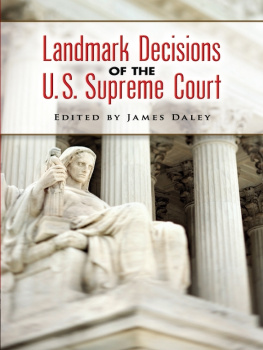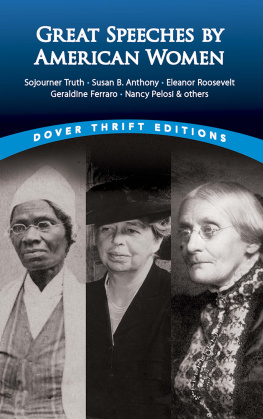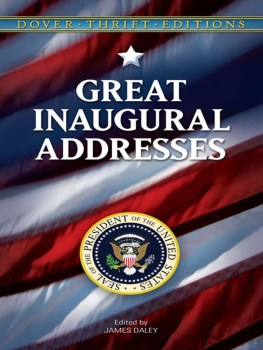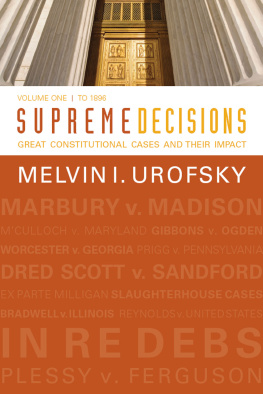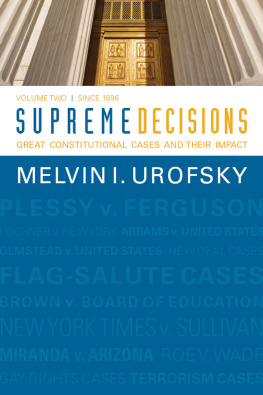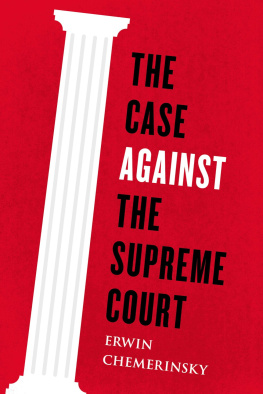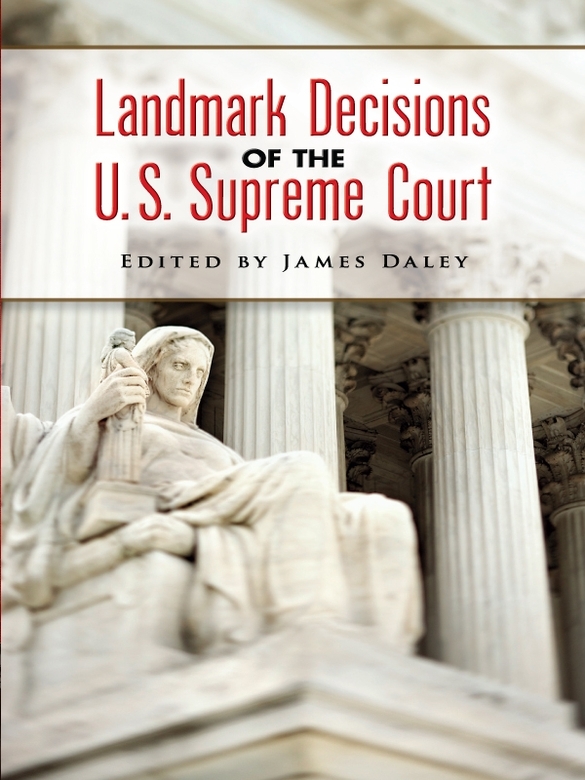Marbury v. Madison
Following Thomas Jeffersons defeat of John Adams in the presidential election of 1800, Adams went about appointing sixteen new circuit judges and forty-two new justices of the peace for the District of Columbia. However, when Adams failed to deliver four of the justices of the peace (including William Marbury) before his last day in office, Jeffersons new secretary of state, James Madison, refused to give these four men their commissions. Marbury, in turn, called upon the Supreme Court to exercise a power Congress had bestowed upon it in the Judiciary Act of 1789 by issuing a writ of mandamus ordering Madison to deliver the four appointees to their commissions.
It was the decision of the court that, because the jurisdiction bestowed upon it in the Judiciary Act was not enumerated in the Constitution, the Judiciary Act was null and void, and therefore the court did not have the authority to issue the requested writ of mandamus. The great significance of this case, however, comes from the fact that in order to reach this decision, the court found that it had the power and authority to review acts of Congress for their conformity to the Constitution.
U.S. SUPREME COURT
MARBURY V. MADISON, 5 U.S. 137 (1803)
5 U.S. 137 (Cranch)
WILLIAM MARBURY
V.
JAMES MADISON, SECRETARY OF STATE
OF THE UNITED STATES.
February Term, 1803
AT THE December term 1801, William Marbury, Dennis Ramsay, Robert Townsend Hooe, and William Harper, by their counsel [5 U.S. 137, 138] severally moved the court for a rule to James Madison, secretary of state of the United States, to show cause why a mandamus should not issue commanding him to cause to be delivered to them respectively their several commissions as justices of the peace in the district of Columbia.
This motion was supported by affidavits of the following facts: that notice of this motion had been given to Mr. Madison; that Mr. Adams, the late president of the United States, nominated the applicants to the senate for their advice and consent to be appointed justices of the peace of the district of Columbia; that the senate advised and consented to the appointments; that commissions in due form were signed by the said president appointing them justices, &c. and that the seal of the United States was in due form affixed to the said commissions by the secretary of state; that the applicants have requested Mr. Madison to deliver them their said commissions, who has not complied with that request; and that their said commissions are withheld from them; that the applicants have made application to Mr. Madison as secretary of state of the United States at his office, for information whether the commissions were signed and sealed as aforesaid; that explicit and satisfactory information has not been given in answer to that inquiry, either by the secretary of state, or any officer in the department of state; that application has been made to the secretary of the senate for a certificate of the nomination of the applicants, and of the advice and consent of the senate, who has declined giving such a certificate; whereupon a rule was made to show cause on the fourth day of this term. This rule having been duly served[5 U.S. 137, 139] Mr. Jacob Wagner and Mr. Daniel Brent, who had been summoned to attend the court, and were required to give evidence, objected to be sworn, alleging that they were clerks in the department of state, and not bound to disclose any facts relating to the business or transactions of the office.
The court ordered the witnesses to be sworn, and their answers taken in writing; but informed them that when the questions were asked they might state their objections to answering each particular question, if they had any.
Mr. Lincoln, who had been the acting secretary of state, when the circumstances stated in the affidavits occurred, was called upon to give testimony. He objected to answering. The questions were put in writing.
The court said there was nothing confidential required to be disclosed. If there had been, he was not obliged to answer it, and if he thought any thing was communicated to him confidentially he was not bound to disclose, nor was he obliged to state any thing which would criminate himself.
The questions argued by the counsel for the relators were, 1. Whether the supreme court can award the writ of mandamus in any case. 2. Whether it will lie to a secretary of state, in any case whatever. 3. Whether in the present case the court may award a mandamus to James Madison, secretary of state.
[5 U.S. 137, 153]
Mr. Chief Justice MARSHALL delivered the opinion of the court.
At the last term, on the affidavits then read and filed with the clerk, a rule was granted in this case, requiring the secretary of state to show cause why a mandamus [5 U.S. 137, 154] should not issue, directing him to deliver to William Marbury his commission as a justice of the peace for the county of Washington, in the district of Columbia.
No cause has been shown, and the present motion is for a mandamus. The peculiar delicacy of this case, the novelty of some of its circumstances, and the real difficulty attending the points which occur in it, require a complete exposition of the principles on which the opinion to be given by the court is founded.
These principles have been, on the side of the applicant, very ably argued at the bar. In rendering the opinion of the court, there will be some departure in form, though not in substance, from the points stated in that argument.
In the order in which the court has viewed this subject, the following questions have been considered and decided.
1. Has the applicant a right to the commission he demands?
2. If he has a right, and that right has been violated, do the laws of his country afford him a remedy?
3. If they do afford him a remedy, is it a mandamus issuing from this court?
The first object of inquiry is,
1. Has the applicant a right to the commission he demands?
His right originates in an act of congress passed in February 1801, concerning the district of Columbia.
After dividing the district into two counties, the eleventh section of this law enacts, that there shall be appointed in and for each of the said counties, such number of discreet persons to be justices of the peace as the president of the United States shall, from time to time, think expedient, to continue in office for five years. [5 U.S. 137, 155] It appears from the affidavits, that in compliance with this law, a commission for William Marbury as a justice of peace for the county of Washington was signed by John Adams, then president of the United States; after which the seal of the United States was affixed to it; but the commission has never reached the person for whom it was made out.
In order to determine whether he is entitled to this commission, it becomes necessary to inquire whether he has been appointed to the office. For if he has been appointed, the law continues him in office for five years, and he is entitled to the possession of those evidences of office, which, being completed, became his property.
The second section of the second article of the constitution declares, the president shall nominate, and, by and with the advice and consent of the senate, shall appoint ambassadors, other public ministers and consuls, and all other officers of the United States, whose appointments are not otherwise provided for.
The third section declares, that he shall commission all the officers of the United States.

